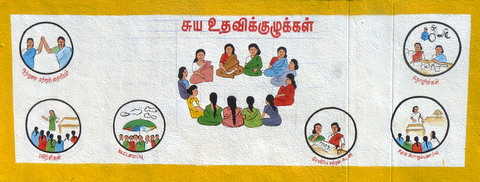
The micro-finance programme developed by Humanium and its local partners in India builds on self- help and on the training of women’s groups in villages. Olivier Soret, founding president of Humanium, answers a few questions on women’s groups and self-help.
What is the role of self-help in the development of villages where Humanium acts ?
Humanium supports aid leading to self-help. The concept of the Self-Help group is central. Any action of social mobilisation and all actions in villages in general are mainly based on self-help groups.
What form does self-help take in practice?
Women start by committing to a self-help group, where they support each other, discuss their problems and think about solutions. Humanium’s local partners will provide training for them. The training will first address the notion of the self-help group itself, then will continue onto skill- development, literacy classes, professional training, micro-enterprise management, etc. Then, they will obtain a micro-credit and start an income-generating activity. During this whole process, and beyond, the group is present and supports each of its members.
Is the micro-credit a group micro-credit?
The micro-credit can take various forms, but it generally remains individual- or project-specific. However, help from within the group is available here too. The female leaders of the group negotiate with banks, and the group acts as guarantor for each of its members. The warranty they propose to the bank is a common initial saving fund for the group that serves to guarantee the loan. They also learn to better manage their money.
What happens when the micro-credits are refunded?
The women continue to help each other. They go even further, they create for example micro-savings funds, and invest in their own businesses.
Does this work?
Yes, and what is wonderful is to see the transformation of these women. It is not only an improvement of living conditions from an economic or socio-economic perspective, it is also an inner transformation for these women. Imagine silent women, with little self-confidence. Put them in groups, show them how to mutually help each other, and you will see the change month after month: They become strong, willing, determined, and carry a very profound dignity. This is the change that leads to all changes, because they become different, because they lose their fear and because they know they can count on others if there is a crisis. Self-help, mutual aid, that is the first driver of change.

